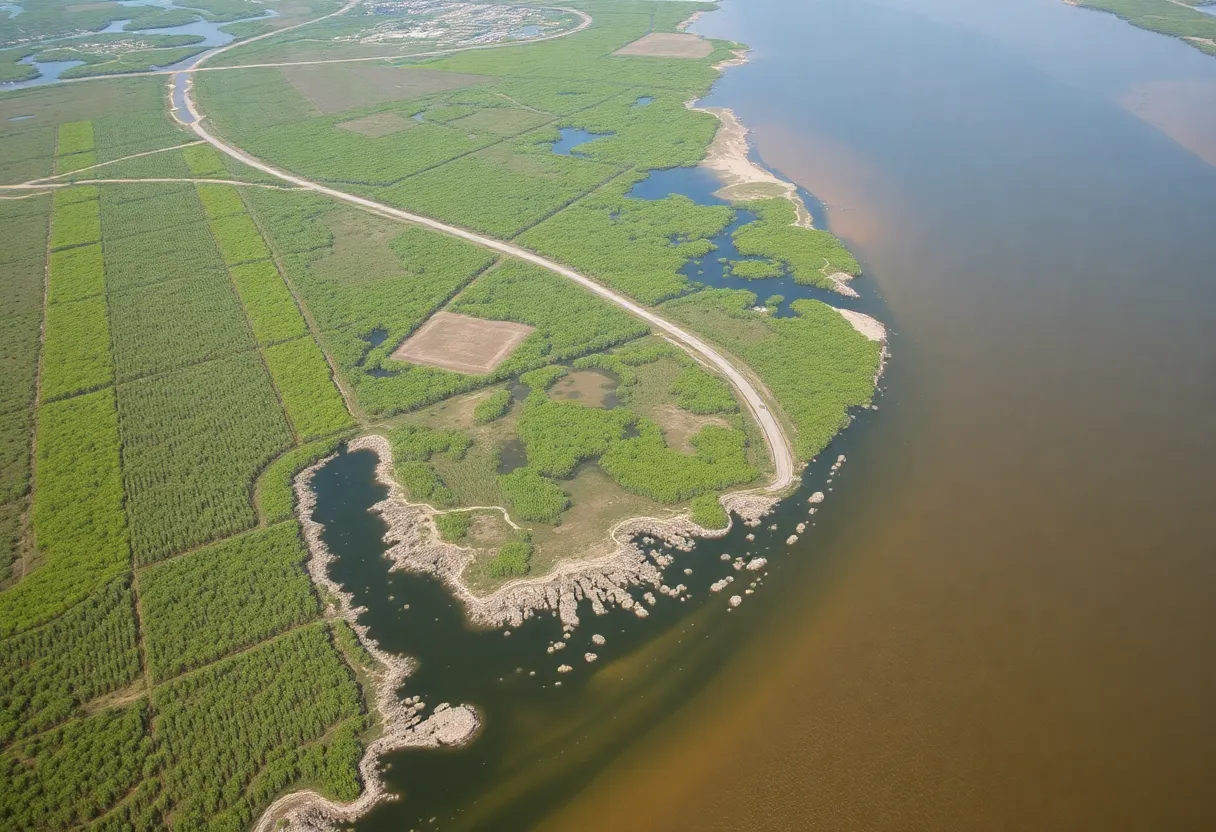News Summary
Governor Jeff Landry’s recent decision to cancel the $3 billion Mid-Barataria Sediment Diversion Project has sparked outrage among environmentalists and stakeholders in Louisiana. The project, part of a comprehensive 50-year coastal restoration plan, aimed to combat severe coastal erosion in the wake of climate change. Critics argue this move threatens Louisiana’s fragile wetlands and coastal communities, reiterating the urgent need for effective environmental policies. While some local residents welcome the decision, experts warn it may hinder long-term restoration efforts crucial for safeguarding New Orleans and its surrounding areas.
New Orleans, Louisiana – The recent cancellation of the $3 billion Mid-Barataria Sediment Diversion Project by Governor Jeff Landry has ignited controversy surrounding Louisiana’s coastal restoration initiatives. This decision disrupts a long-standing commitment to rebuilding eroding coastal areas and protecting New Orleans, twenty years after the devastation of Hurricane Katrina.
Louisiana’s coastal wetlands are disappearing at an alarming rate, more rapidly than any other region in the United States, primarily due to climate change and various human activities. The state had established a 50-year coastal restoration plan that aimed to utilize mud and sediment from the Mississippi River to rebuild the land lost to erosion. However, Governor Landry’s announcement seems to compromise this strategy, raising concerns among experts and advocates alike.
Concerns over financial viability and potential risks to the seafood industry were cited by Governor Landry as key reasons for canceling the project. This decision, however, has been met with significant backlash from various stakeholders who believe it reflects a regression to political meddling in coastal policymaking and undermines evidence-based approaches to restoration.
Notably, the cancellation has been labeled an “existential decision” for Louisiana’s future, with wide-ranging support for the Mid-Barataria project from both the political and scientific communities. Previously, the initiative enjoyed bipartisan backing from a range of state leaders, including governors from both major political parties.
In the wake of the cancellation, residents of Plaquemines Parish, particularly those in the oyster farming industry, have expressed relief. Concerns that the sediment diversion would negatively impact their livelihoods have influenced public opinion in this region. However, the bulk of experts warn that this decision may prolong ongoing efforts to address coastal land loss and jeopardize protective wetlands crucial for storm surge absorption.
The project had already consumed approximately $618 million in public funds, raising questions about potential reimbursements following its abrupt halting. Following the announcement, Landry’s office indicated new coastal restoration plans, promising a more balanced approach that considers environmental needs alongside economic interests.
The cancellation follows a historical pattern of land loss in Louisiana, which has been exacerbated by oil and gas drilling, levee construction, and rising sea levels. The Mid-Barataria project was designed to funnel Mississippi River water into the Barataria Basin, a strategy intended to create new land that would serve to mitigate storm effects and flood risks.
With the cessation of this particular project, experts are increasingly concerned about the delays it may cause in tackling the urgent issues of coastal land loss and the deterioration of natural barriers against storms. The Mid-Barataria project was supported by a comprehensive strategy emphasized by scientists and environmental advocates, highlighting the pressing need for restoring natural coastal protections.
Critics now recommend that the focus shifts towards alternative restoration projects employing smaller sediment diversions with potentially lesser impacts on water salinity levels. In the past, the Army Corps of Engineers has conducted substantial studies illustrating the benefits of sediment diversions in land-building and ecosystem restoration.
Residents and environmental advocates are sounding alarms as concerns about balancing the needs of the seafood industry with effective ecological restoration loom large. Observations in various locations, including Quarantine Bay, suggest that natural sedimentation processes can effectively create new wetlands, often contrasting with engineered diversions like Mid-Barataria.
There remains a strong emphasis among the environmental community on the urgent need for more comprehensive and dynamic restoration initiatives to effectively manage the ongoing crisis of land loss in Louisiana. The overwhelming impact of Hurricane Katrina on local communities is a persistent reminder of the importance of both natural and human features in mitigating flooding risks.
The ongoing debate surrounding the Mid-Barataria diversion project encapsulates the broader tensions between environmental science and political decision-making relative to coastal management. Former representatives and scientific voices continue to call for enhanced efforts to reconnect the river with its delta, advocating for a strategic approach to restore damaged coastal areas while educating the public about the significance of wetlands as natural protective infrastructures.
Deeper Dive: News & Info About This Topic
- Southern Living: Louisiana Wetland Loss and Hurricane Katrina
- WDSU: Experts on Louisiana’s Wetland Restoration
- Dredging Today: Grant for Chandeleur Island Restoration
- KLFY: Restoration of Gulf Coast Ecosystem
- Eco Magazine: NOAA Support for Coastal Louisiana Restoration
- Wikipedia: Wetlands
- Google Search: Louisiana Wetland Restoration
- Google Scholar: Louisiana Coastal Restoration
- Encyclopedia Britannica: Wetland
- Google News: Louisiana Wetland Loss

Author: STAFF HERE NEWORLEANS WRITER
The NEW ORLEANS STAFF WRITER represents the experienced team at HERENewOrleans.com, your go-to source for actionable local news and information in New Orleans, Orleans Parish, and beyond. Specializing in "news you can use," we cover essential topics like product reviews for personal and business needs, local business directories, politics, real estate trends, neighborhood insights, and state news affecting the area—with deep expertise drawn from years of dedicated reporting and strong community input, including local press releases and business updates. We deliver top reporting on high-value events such as French Quarter Festival, New Orleans Jazz & Heritage Festival, and Essence Music Festival. Our coverage extends to key organizations like the New Orleans Chamber of Commerce and Greater New Orleans, Inc., plus leading businesses in energy, healthcare, and education that power the local economy such as Entergy, Ochsner Health, and Tulane University. As part of the broader HERE network, including HEREShreveport.com, we provide comprehensive, credible insights into Louisiana's dynamic landscape.

